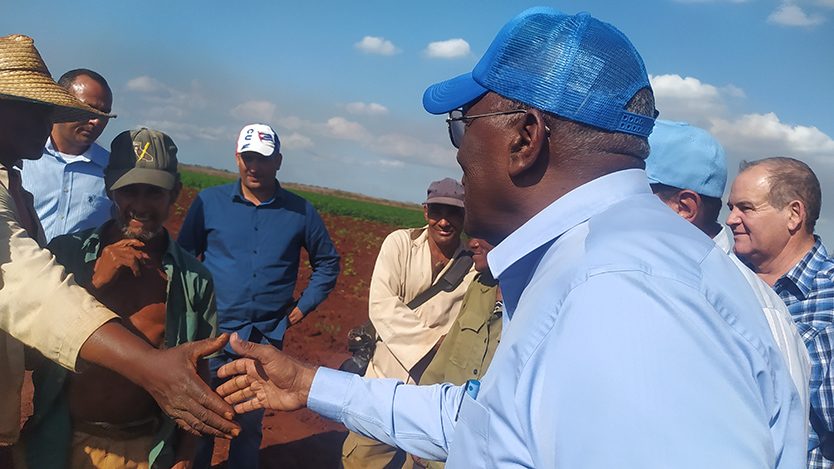
The completion of the new structure of the government bodies in Florencia and Primero de Enero, the existing development strategy in those territories and the pressures of production to win the food sovereignty race were issues checked by Cuban Vice President Salvador Valdés Mesa , who urged to understand that the economic, political and social life of the country is decided in the municipality.
Since autonomy begins with the understanding of this role, they are involved in the conformation of the 13 directions and the nine departments that the local administrations will have. To date, Florencia has achieved greater completion than Primero de Enero, although more speed was insisted on, since a second stage of implementation should begin in April and criteria and assessments of the operation and possible changes will be necessary.
Mireya Cardoso Guevara, mayor in Florencia, explained that five files were prepared for organizational movements by Resolution 27/2021, while those of the budgeted Health Insurance and Support units, the Education Insurance and Support unit, and the Assurance and Administration Support are already completed and dispatched for review. In turn, four vice-mayors were approved and two budgeted units were created.
In Primero de Enero, the Achilles heel is the identification of people who can assume responsibilities, especially in vital directions such as commerce and local development, to which is added a growth in the workforce that went from 420 to 457 Therefore, an exhaustive review was indicated so as not to exceed the existing salary budget.
The role that both territories play in food production and how this has to be a directive line in local development strategies only increased the challenges for both municipalities, to which Salvador Valdés Mesa, Cuban vice president, added the importance to revalue rurality and work in the field.
“We are talking about areas of high agricultural value and with an important weight in the country's food balance, Florencia and Primero de Enero have to be self-sufficient in production and capable, later, of contributing to territories where they are not planted. We have to help the most proactive and committed producers with the few resources we have,” he emphasized.
In the municipality of Los Bellos Paisajes, the municipal development strategy was approved since 2010, it has had five updates and includes matters related to food sovereignty and food and nutritional security, development of local industry and use of renewable sources, management of science and innovation for local development, community development with an equity approach and improvement of environmental quality and living conditions of the inhabitants.
Hence, the sowing of fingerlings in reflecting bodies of water, raising the per capita of 30.2 pounds per inhabitant of food, vegetables and vegetables, the improvement of the livestock mass and the contribution of milk, the successes of the Conectando Paisajes program and the scope of the project Barrio Adentro connects with these projections and monopolizes the efforts.
In Primero de Enero, the potential is concentrated in the increase in the areas dedicated to sugarcane, in the efficiency of milling in the sugar mill and in the Arnaldo Ramírez Company, which, despite the limitations faced by the agricultural sector, has emerged unscathed of economic losses and with a sustained development of various crops.
However, making the most of the 14,000 hectares it owns, of which only around 2,000 are planted, was the observation made by Salvador Valdés Mesa. “We cannot continue importing the food that we can produce here at the cost of thousands of dollars, that money can be used to stimulate the development of the industry or buy technology. We cannot afford that luxury," he acknowledged.
The debate also focused on the development of the rustic and semi-rustic chicken program for which producers and areas have already been defined, and work is being done on the construction of infrastructure in these territories, included within the 28 municipalities of the country that will start the experiment.
According to Leyda Martínez Arnáez, director of the province's Poultry Company, birds will be delivered with 84 days of life and around 170 may be laying. Florence will receive 3,100 animals and on January 1st there will be around 2,000.




